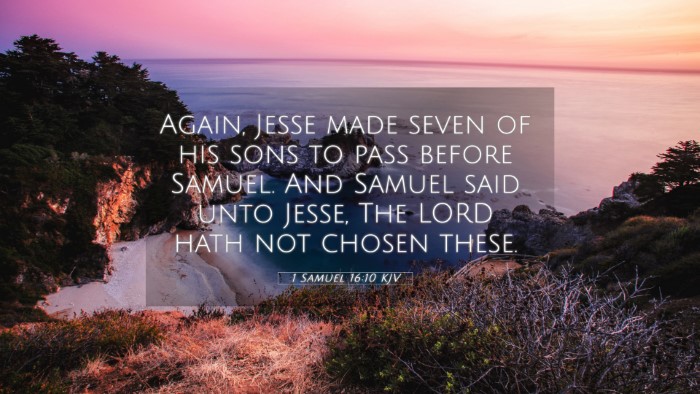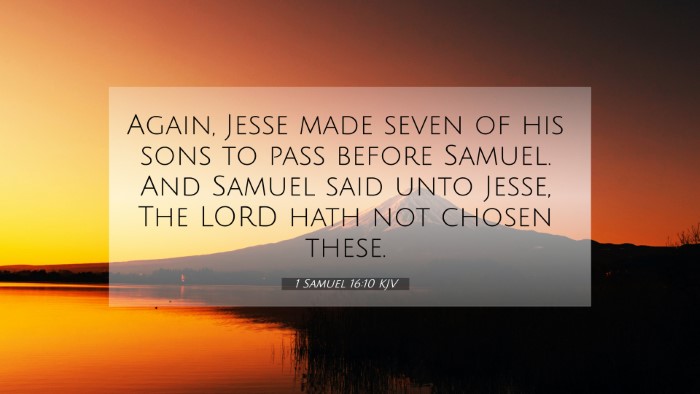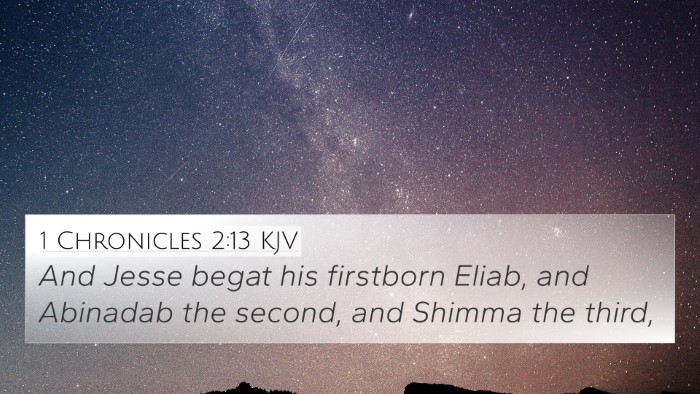Understanding 1 Samuel 16:10: A Comprehensive Study
1 Samuel 16:10 states, "And Jesse made seven of his sons to pass before Samuel. And Samuel said unto Jesse, The Lord hath not chosen these." This verse highlights the moment when the prophet Samuel was sent to anoint a new king of Israel, and none of Jesse's seven sons were chosen by God. Below, we will explore the insights gained from various public domain commentaries, providing a thorough interpretation and connecting relevant scripture.
Significance of the Verse
This verse is pivotal in the narrative of God's selection of David, the future king of Israel. It emphasizes several key themes:
- Divine Selection: The verse underscores that God’s choices often defy human expectations.
- Humanity's Limitations: It reminds believers that outward appearances are not the basis for God’s decisions.
- Preparation of the Heart: God looks beyond physical attributes to the heart and character of individuals.
Commentary Insights
Below are insights from various esteemed commentaries:
- Matthew Henry: Henry explores the theme of God's sovereignty, noting how the rejection of seven sons illustrates that His choices are deliberate and purposeful. He encourages readers to trust in God's plan even when it contrasts with human judgment.
- Albert Barnes: Barnes emphasizes the significance of God's choice being based on His understanding of the heart. He contrasts the appearances of Jesse’s sons with God's evaluation, highlighting the importance of spiritual integrity over superficial traits.
- Adam Clarke: Clarke delves into the historical context, explaining that the choice of David illustrates God's providence in the lineage of Christ. He also discusses the implications of divine election, reaffirming that God’s decisions are made to fulfill His purposes.
Bible Cross-References
To deepen the understanding of 1 Samuel 16:10, we can link it to several other biblical passages that illuminate the same themes:
- 1 Samuel 16:7 - "But the Lord said to Samuel, 'Do not consider his appearance or his height, for I have rejected him. The Lord does not look at the things people look at. People look at the outward appearance, but the Lord looks at the heart.'
- Psalm 78:70-72 - "He chose David his servant and took him from the sheep pens; from tending the sheep he brought him to be the shepherd of his people Jacob, of Israel his inheritance."
- 1 Chronicles 28:4 - "Yet the Lord, the God of Israel, chose me from my whole family to be king over Israel forever. He chose Judah as leader, and from the tribe of Judah he chose my family, and from my father's sons he was pleased to make me king over all Israel."
- Acts 13:22 - "After removing Saul, he made David their king. God testified concerning him: 'I have found David son of Jesse, a man after my own heart; he will do everything I want him to do.'"
- 1 Peter 2:9 - "But you are a chosen people, a royal priesthood, a holy nation, God’s special possession, that you may declare the praises of him who called you out of darkness into his wonderful light."
- Romans 8:30 - "And those he predestined, he also called; those he called, he also justified; those he justified, he also glorified."
- Hebrews 11:32-34 - "And what more shall I say? I do not have time to tell about Gideon, Barak, Samson and Jephthah, about David and Samuel and the prophets, who through faith conquered kingdoms, administered justice, and gained what was promised; who shut the mouths of lions, quenched the fury of the flames, and escaped the edge of the sword; whose weakness was turned to strength..."
Thematic Connections
The themes identified in 1 Samuel 16:10 resonate across both the Old and New Testaments:
- God's Choice: The principle of divine selection is seen throughout scripture, as seen in the calls of Abraham, Moses, and the Apostles.
- Spiritual Leadership: The importance of the heart in leadership can be observed in the qualifications for church leaders in the New Testament (1 Timothy 3).
- Faith and Obedience: The narrative illustrates the necessity of faithfulness in one’s calling, a concept prevalent in both the Old and New Covenants.
Tools for Bible Cross-Referencing
Utilizing various tools can enhance your study of scripture and facilitate cross-referencing:
- Bible Concordance: A comprehensive listing of words found in the Bible to help locate verses.
- Bible Cross-Reference Guide: Resources specifically designed to direct readers to related verses based on themes or keywords.
- Cross-Reference Bible Study: Methods for studying passages in conjunction with others to unveil deeper meanings and connections.
- Bible Reference Resources: Tools like commentaries and online databases provide insights and facilitate inter-Biblical dialogue.
- Bible Chain References: A method of linking verses in a sequence, allowing for a thematic approach to scripture.
Conclusion
1 Samuel 16:10 teaches valuable lessons about God's process of selection and the importance He places on the heart. By exploring this verse alongside related scriptures, we understand a broader theological narrative about divine choices and leadership. Employing tools for cross-referencing will enhance your understanding and engagement with the Bible's teachings.



